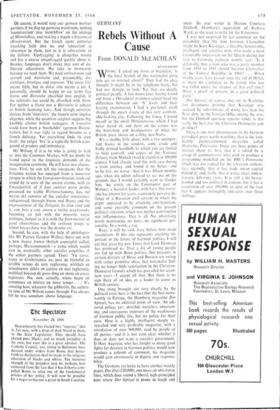Rebels Without A Cause
GERMANY
From DONALD McLACHLAN
DUSSELDORF
'WHERE,' I asked my hosts at breakfast, 'is the local branch of this nationalist party you are so worried about?' They had no idea,
thought it might be in the telephone book, but had not thought to look. Yet they are deeply political people. A few hours later, having found out from a Diisseldorf grammar-school head the differences between our 'A' levels and their leaving examination, I had a pre-lunch stroll through the smart streets of this very comfort- able-looking city. Following my fancy, I found
myself in the -small Hiittenstrasse, which I had never heard of, and there on the corner was the bookshop and headquarters of what the British press insists on calling neo-Nazis.
It's a shabby little place, with a few unimpor- tant books in the window, some crude and
badly printed handbills to which you are invited to help yourself, and copies of the National Zeitung from Munich (weekly circulation 100,000 copies). I had already read this with care during a train journey and found it no better—and to be fair, no worse—that it was fifteen months ago, when the editor refused to see me on the grounds that I would certainly want to slander him. An article on the Communist past of Wehner, a Socialist leader, with facts that every- one has known for years, a curiously perverse de- fence of a Bavarian civil servant in which the
paper appeared to be attacking anti-Semitism, and some excitable comment on the present political situation, which was neither constructive nor inflammatory. That is all. No advertising worth mentioning, no news, no significant per- sonality. In a word, a rag.
Rags, it will be said, have before now made revolutions. If this one represents anything im- portant in the future of German politics, I will eat that great big new Times that Lord Thomson has promised us. That a lot of young people are fed up with Bonn politics, that peasants in certain districts of Hesse and Bavaria are voting with rather primitive ideas, that nationalist feel- ing no longer finds satisfaction in the Christian- Democrat formula which has prevailed for seven- teen years—I accept all that. But there is no sign there of an idea or a leader to cause us British anxiety.
One thing brought out very clearly by the political crisis here is the fact that the best news- weekly in Europe, the Hamburg magazine Der Spiegel, has no editorial point of view. An edi- torial policy, yes: detailed, merciless, entertain- ing, and courageous exposure of the weaknesses of German public life, but no policy for their cure. Here is a highly intelligent, deeply re- searched and very profitable magazine, with a circulation of over 900,000, read by people of all parties—and it is not even clear whether it does or does not want a socialist government. If Herr Augstein, who has fought so many good fights for decency in German politics, would now produce a column of comment, his magazine would gain enormously in dignity and responsi- bility.
The Germans are lucky to have another weekly paper, Die Zeit (220,000), run more on SPECTATOR lines, which does sound a liberal, high-principled note where Der Spiegel is prone to laugh and sneer. Its star writer is Marion Countess Donhoff, Hamburg's equivalent of Barbara Ward, as she used to write for the Economist.
I was not surprised by her comment on the possibility that the next German Chancellor might be Kurt Kiesinger, a likeable, honourable, intelligent and sensitive man, who made a most favourable impression on the Queen during her visit to Germany eighteen months ago: 'Is it defensible that a man who was a party member from 1933 to 1945 should become Chancellor of the Federal Republic in 1966? . . . When twenty years have passed since the fall of Hitler, is there no candidate to be found who has not fallen under the shadow of that evil time? What a proof of poverty in a great political party.'
Der Spiegel, of course, dug out in Washing- ton documents proving that Kiesinger was accused by subordinates of doing less than his Nazi duty in the Foreign Office during the war, but the Donhoff question remains valid: is this really the best that the Christian Democrats can produce?
There is one new phenomenon in the German periodical press worth watching, that is the fort- nightly picture-comment magazine called Deutsches Panorama. There are three points of interest about it: first, that it is edited by a group of commentators who used to produce a programme modelled on the BBC's Panorama which was too radical for the television authori- ties; secondly, that it has trade union capital behind it; and, lastly, that it writes clear, undoc- trinaire, left-wing views. It is still a bit heavy- handed and too political in content, but it has a circulation of over 100,000, in spite of the fact that it appears fortnightly and costs over three shillings.














































 Previous page
Previous page